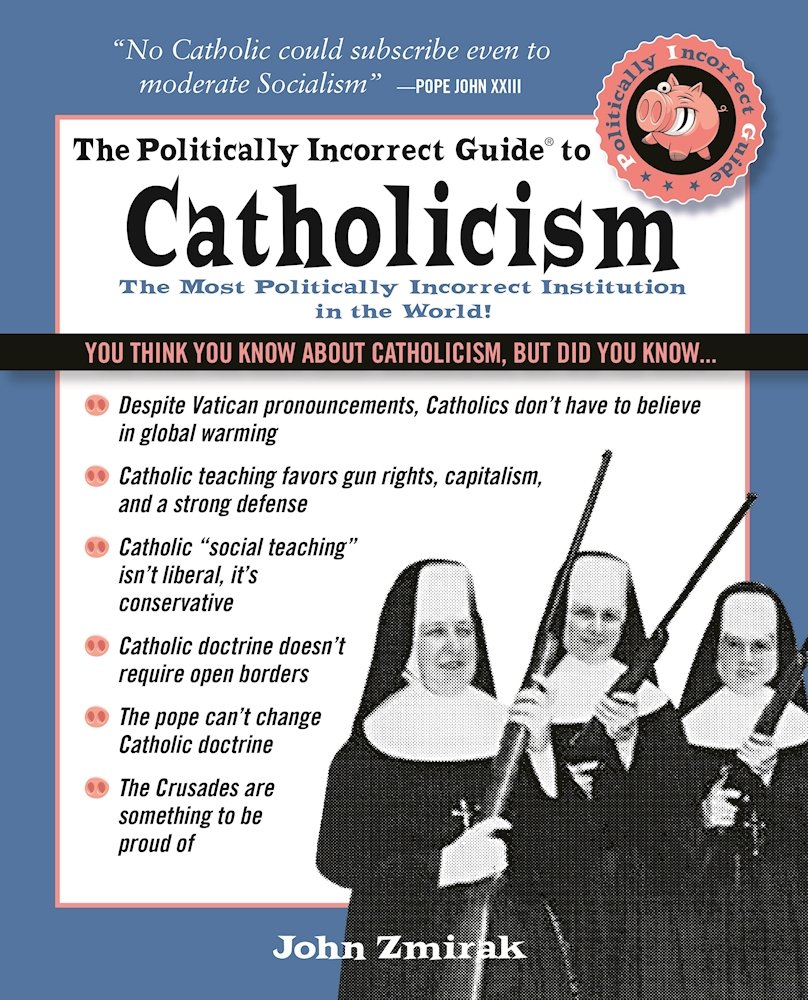Are Liberals Destroying The Catholic Church From Within?

Congratulations John Zmirak on your new book The Politically Incorrect Guide to Catholicism! Give us an overview of your book and tell us why you wrote it.
The book is an effort to pry off all the ideological crust that has become attached to the faith of my childhood, which has guided me ever since. That faith is distorted by media, perverted by the likes of Tim Kaine and Joe Biden, and hijacked by leftists as a vehicle for promoting far-left, Utopian politics that would have been utterly unrecognizable to 2,000 years of Catholic statesmen and popes. Not to mention, you know, Our Lord.
So give us an example or two of something in Catholicism that’s politically incorrect?
The Church teaches that there is ONE truth. One. Regardless of culture, politics, economics, our cravings or aspirations or the way the truth makes us FEEL. It’s out there, in the Gospels, and in here, written on our hearts. We are obliged to live by it, or face the ugly consequences in this life and the next. I can’t think of a message more offensive to our shallow, thin-skinned culture.
The Church affirms what rational observation tells us—that human nature is fixed, and travels through the centuries making the same kinds of mistakes over and over again. Only by listening to God and trying to obey Him can we improve things and find some happiness in this vale of tears. Postmodern people don’t even want to admit that people with penises are “men,” much less that there’s an eternal significance to every detail of how God made us.
In your book, you also spend some time discussing the Pope. What are your thoughts on Pope Francis and his political views? Is he hurting or helping the faith?
I’m very sad to say this, but Pope Francis is doing everything humanly possible to remake the Church on the model of the dying, “mainline” Protestant denominations. There are limits to what the Holy Spirit will allow. This papacy is an empirical, real-time test of how far those limits extend, and where God draws the line. If a meteor falls on the Vatican, we’ll know that a line was about to be crossed. His political views are his own, and have no divine authority. The pope is not an oracle fed by constant divine inspiration of smart insights on ecology, economics, immigration, or U.S. elections. We know that from studying the corrupt popes of the Renaissance. We survived them, and we’ll survive this. But how long, O Lord?
You also suggest that St. Thomas Aquinas discovered the free market before Adam Smith. How so?
The Church pioneered the market economy, transforming the West from an agrarian, slave-based economy of exploitation to a vibrant, world-dominating force for the mass improvement of human life, expansion of life-spans, cutting of infant mortality—the list goes on and on. Catholic monks discovered how to make fields produce three or four times what they had before. Catholic engineers invented the water-wheel, the windmill, crop rotation, the mechanical clock. Thomas Aquinas and later Dominicans studied and explained the price system, banking, and investment—providing sound moral guidance that later materialists and socialists like Marx would ignore.
What 2-3 takeaways would you like readers to leave with after reading your book?
- The Church is not the opinion of local bishops or even of a single pope. It’s a relay race going back to the Apostles and to Jesus. We’re handing on the baton that is the “Deposit of Faith.” If it gets crusted with our short-term priorities or trendy political views, we need to polish it up and get back its original shine. That’s what I’m trying, in my own small way, to do.
- The political interests of our current bishops are different from the teachings of the Church. They want open borders to keep the churches full for a few years; the Catechism doesn’t demand that, or even recommend it. They want federal grants for their charities; that’s not how the Church defines outreach to the poor. And so on.
- We can’t act like a self-satisfied, inward-looking tribe if we want to evangelize the world. We need to be self-critical, and hold ourselves and our fellow Catholics to HIGHER (not lower) standards than we would pagans or other non-Catholics. If we’d done that, thousands of kids wouldn’t have been abused—to choose just one instance where tribalism and institutional self-interest sabotaged the Gospel.











